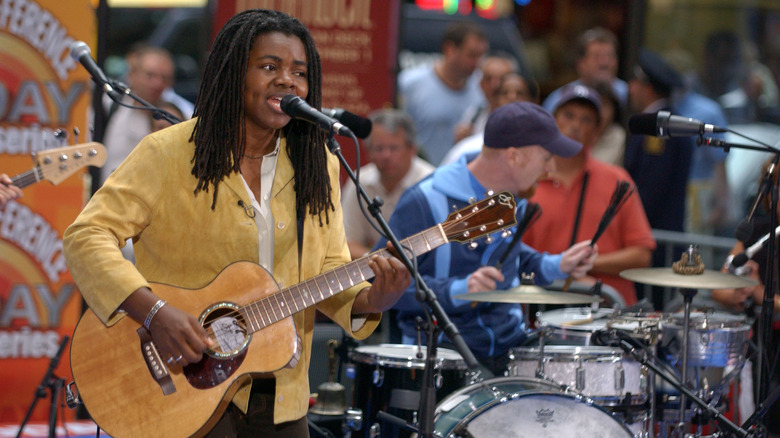The Drama Involving Tracy Chapman And Luke Combs' Hit Song Fast Car
With the Grammy Awards on the horizon, fans are anticipating some exciting performances, including a duet between Tracy Chapman and Luke Combs. Combs' rendition of Chapman's 1988 folk rock song "Fast Car" earned him a Grammy nomination for Best Country Solo Performance. When Combs won the single of the year award at the CMAs, he gushed, "First and foremost, I want to thank Tracy Chapman for writing one of the best songs of all time," per Today. Despite the excitement, Combs' "Fast Car" version has stirred up drama.
Combs' 2023 cover took the No. 1 spot on Billboard's Country Airplay chart. Additionally, Chapman became the first Black female solo writer to top the chart since its 1990 premiere. With the resurgence of her track, Chapman also topped the Billboard's Country Songwriters chart. The original "Fast Car" singer told Billboard, "I never expected to find myself on the country charts, but I'm honored to be there. I'm happy for Luke and his success and grateful that new fans have found and embraced 'Fast Car.'" Chapman's return to the spotlight has also come with a hefty paycheck from Combs' cover.
Chapman received numerous accolades when she released "Fast Car." In 1989, the Grammy-nominated artist won three awards, including Best Pop Vocal Performance for the hit. But her "Fast Car" success, in relation to Combs', has stirred up debate among listeners and the media. While Chapman and Combs seem supportive of one another, some are calling attention to issues affecting the music industry.
The 'Fast Car' discourse focuses on race, gender, and sexuality
The success of Luke Combs' rendition of Tracy Chapman's "Fast Car" has ignited a complex discourse about race, sexuality, and gender. The Washington Post, for instance, closely examined this topic. The article cited data illustrating the severe lack of country radio play that women of color and LGBTQ+ musicians have received over the years. The publication spoke to Holly G, founder of the Black Opry organization. While she praised Combs for his artistry and inspiration from Chapman, she explained, "[I]t's hard to really lean into that excitement knowing that Tracy Chapman would not be celebrated in the industry without that kind of middleman being a White man."
Tanner Davenport, co-director of the Black Opry, shared that Combs' instant success of the crossover cover "kind of just proves that when you put a White face on Black art, it seems to be consumed a lot easier." Holly G said, "I think the big lesson here is Black women belonged in country music all along." In addition, some fans have expressed frustration about Combs' achievements with "Fast Car." One user tweeted, "My thoughts are that I'm really tired of white men appropriating everything from Black culture & getting all the credit for it."
Some listeners have criticized the media
On the other hand, many listeners have criticized the media for their approach to the "Fast Car" discourse. Conservative politician CJ Pearson tweeted, "I don't know who Tracy Chapman is. But that has a lot more to do with the fact that I was born in 2002 than the fact that she is 'black, queer, and female.' She gave Luke Combs her blessing to remake 'Fast Car.' Why is the media so desperate to inject race into every discussion?" Someone else wrote, "The people who are making this about race, etc., have no idea what they are talking about, considering he covered this song because it inspired him. Music is supposed to unify us, not create division to tear us apart."
While controversy about Luke Combs' "Fast Car" success has left some listeners divided, one scholar recognized the value of these charged conversations. Richard Cooper, African American Studies coordinator at Widener University, told Today, "These kinds of debates, I think, are great because they give an opportunity to raise the larger questions about the fact that, in terms of airplay on largely country stations, you're not going to see Black women — Black queer women — get that kind of exposure or airplay had they released just the original song." Cooper was also happy about Combs' accomplishments as they highlighted Tracy Chapman's tremendous work.



